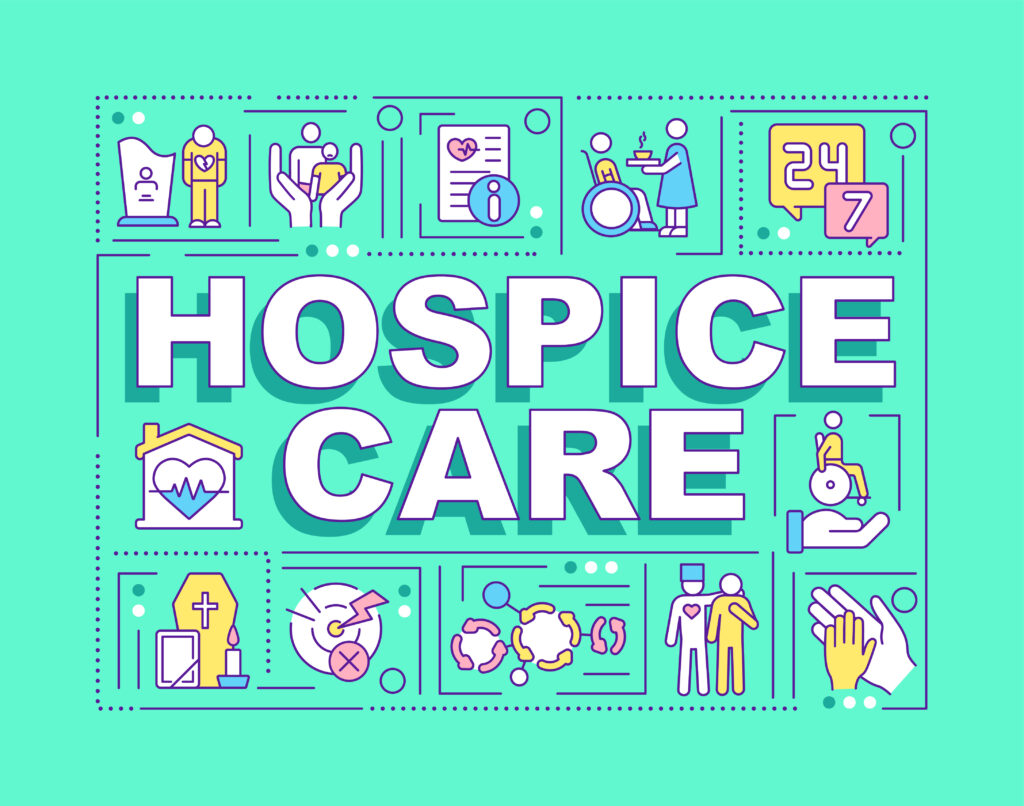As we grow older, it’s important to plan. One aspect of this planning should include end-of-life care. It’s never easy to think about, but it’s essential to be prepared for any situation that may arise. Planning for End-of-Life cares starts long before you need it. This is especially important during National Hospice Month, a time to reflect on end-of-life care and how it can be improved. We will discuss planning for end-of-life care, alternatives to hospice, and ways to take care of caregivers. We hope that this post will provide valuable information and guidance for aging adults and their families.
Death is the inevitable part of life that we all will face one day. It may be an uncomfortable topic to discuss, especially with family members. However, it’s essential to have these conversations to ensure your loved ones receive the best care possible in the final stages of their life. It is also important to make sure their wishes are honored and that they have a “say so” and their choices are acknowledged. In this blog post, we will review the importance of advance life planning for healthcare as we close out National Hospice Month. We will also provide some alternative options to hospice, such as an end-of-life doula and “comfort care.” Moreover, we will review using respite services for a much-needed break for caregivers, and hospice residential facilities and how they can be utilized.

1. Planning for End-of-Life Care
When it comes to end-of-life care, planning is key. This includes creating an advance directive, which is a legal document that outlines your healthcare wishes if you are unable to make them yourself. It’s important to discuss your end-of-life wishes with your family and chosen healthcare professionals. This can avoid any confusion or disagreements later on. You will also avoid the possibility that a stranger such as an “appointed guardian” will need to make decisions for you if your family can’t agree. You can also consider appointing a healthcare proxy, who can make decisions on your behalf if you are unable to. The hospice social worker, a nurse advocate, the clinic social worker can all help you prepare these documents.
Many individuals avoid discussing end of life planning as it is often seen as an uncomfortable and taboo topic. However, avoiding planning can lead to additional stress and uncertainty for both the individual and their loved ones. Adult children fear making the wrong decisions. With the proper documents in place, the guess work is taken away and reduces the risk for “sibling friction.” Starting the conversation early and discussing your wishes for your end of life care is important to ensure that your desires are respected. The children may not agree however if your wishes are in writing everyone can agree on “it’s what YOU want.”
It’s also important to consider your comfort and quality of life. This may include discussing pain management options with your healthcare team, or considering hospice care if your condition is terminal. You should also consider where you want to receive care, such as in your home or a hospice facility.
One important aspect of advance care planning is appointing a durable power of attorney for healthcare. This person has the authority to make medical decisions for you when you are unable to do so. It is crucial to select someone who understands your values and beliefs about end-of-life care. These values and beliefs need to be well-documented, either in a written directive or verbally communicated to your loved ones. Doing so helps prepare them for the discussion of end-of-life care.
Lastly, another reason to have advanced life planning in place is to identify your preferences for life-sustaining treatment. For example, do you want to be on a ventilator or receive artificial nutrition and hydration in case of a terminal illness? Without clear documentation of your preferences, your family may feel uncertain and uncomfortable making decisions on your behalf. Additionally, it would be best to discuss your spiritual or religious beliefs, as they play a significant role in end-of-life care choices.

AdobeStock_487601928-scaled.jpeg
2. Alternatives to Hospice Care
While hospice care is a common option for end-of-life care, there are alternatives that you may want to consider. One option is an end-of-life doula, who provides emotional, spiritual, and physical support during the dying process. They can help create a peaceful and meaningful experience for the individual and their loved ones.
Another option is “comfort cares,” which focuses on providing comfort and support for the individual rather than trying to cure the underlying condition. This approach can be used in conjunction with medical treatments or as an alternative. Another alternative to hospice is “comfort care,” which provides comfort and pain relief but not curative treatments. Choosing this option can be beneficial when a patient is no longer seeking curative treatments but wants to continue receiving care and support.
We will explore the alternatives more closely during this article.
3. Respite Services for Caregivers
Taking care of a loved one who is approaching the end of their life can be emotionally and physically exhausting. That’s why it’s important to take care of the caregiver as well. Respite services can provide a much-needed break for caregivers, allowing them to recharge and take care of their own needs. These services can include in-home care, adult daycare centers, or temporary stays in nursing homes, assisted living facilities, hospital, or residential hospice facility.
One thing to make note of is that unless you are a current hospice patient, respite services are a private pay service. If you are not a hospice patient, your options are paying for in-home care, or a facility. Depending on how much care is needed, this will help determine the appropriate facility. Your Nurse Advocates can come alone side you and your family to help you make the right choice and decision when it comes to choosing a respite stay.

4. Comfort care
Comfort Care is another alternative to hospice care. Comfort care is medical care designed to provide emotional and medical support to those who are approaching the end of their lives. The goal of comfort care is to help reduce the individual’s pain, discomfort, and stress. Comfort care can be provided in a hospital, hospice or at home, depending on the individual’s wishes.
Comfort care means that you no longer want to have curative treatment done and accept that chronic illness such as cancer is going to bring the need of end-of-life cares. This would be a choice when hospice does not want to be elected. One must know that comfort cares do not come with the benefits of hospice such as paid for equipment, medications, oxygen, and services such as nursing, chaplain, social worker, and home health aides.
An appropriate use of “comfort cares” may be when a loved one enters the hospital for an illness and the illness is determined to be terminal or the loved one does not seek any further treatment, the doctor can order comfort cares. The loved one will receive care in the hospital to make them comfortable. The loved one may stay in the hospital if the duration is expected to be short or it is not in the best interest of the loved one to be moved to another facility such as a nursing home or home.
5. Hospice Residential Facilities
Hospice residential facilities are another option for those who need a higher level of care. These facilities provide 24-hour medical and emotional support to individuals in a home-like setting. Hospice residential facilities allow individuals to receive care in a homely and comfortable environment with compassionate professionals and staff.
If home care isn’t an option, hospice residential facilities can be another option to consider. These facilities specialize in end-of-life care and can provide a comfortable and supportive environment for individuals and their families. They often have specialized staff who can assist with medical needs, as well as support services for emotional and spiritual concerns.
The hospice benefit does not pay for residential care and not all hospice agencies offer residential care. The room and board to live at a hospice residential facility is private pay and often times can be negotiated based on income levels. This may be a good option for those families that keeping the loved one at home is not an option that is feasible for the family.
6. End-of-Life Doula
When it comes to alternative options for hospice, an end-of-life doula can be helpful. An end-of-life doula is a non-medical professional trained in providing emotional support and guidance to the dying person and their loved ones. They help with the physical and emotional aspects of the death process to ensure that the dying person is comfortable and at peace.
While hospice is a popular choice for end-of-life care, it is not the only option. For those who wish to have a more personal experience, an end-of-life doula may be a valuable alternative or often times a doula will work alongside hospice. An end-of-life doula can provide emotional support, guidance, and assistance to individuals and their families during this difficult time. They can also help to ensure that the dying individuals wishes are respected.
An end-of-life doula is a private pay service. This is one reason a doula would like to work with you along with hospice so you can receive all the benefits hospice can offer as mentioned earlier.
End of life doulas also provide support for legacy work, which involves helping individuals reflect on their lives and create a tangible legacy that they can leave behind for their loved ones. This can include writing letters or recording messages to loved ones, creating memory books or scrapbooks, or completing other projects that reflect who they are and what is important to them. These extra special services can be added with the doula that the hospice agency may not have the extra time to assist with.
Another benefit of an end-of-life doula is their ability to work with the family to learn what to expect in the dying process. This can include providing education about the physical and emotional changes that may occur, as well as offering practical tips and advice for managing symptoms and providing comfort. This can help to ease the anxiety and uncertainty that often accompanies this process, allowing individuals and their families to focus on what is truly important – spending quality time together and creating meaningful memories. Often, the doula can be more flexible with time and stay for longer periods.

Overall, an end-of-life doula provides compassionate and empathetic support to help individuals and their families navigate the end of life with grace and dignity. By changing the narrative about talking about the dying process, we can help ensure that our loved ones are honored and that their wishes are respected. If you or a loved one is approaching the end of life, consider the benefits of an end-of-life doula to provide the support and guidance you need during this difficult but important time.
Conclusion:
Death is an uncomfortable topic that many people try to avoid discussing. However, it’s essential to plan for end-of-life care and document your values and beliefs about the process. Advance care planning is crucial to ensure that your loved ones receive the best possible care in their final stage of life. Additionally, alternative options to hospice can be explored, such as an end-of-life doula or “comfort care.” If you’re a caregiver, taking breaks through respite services or considering hospice residential facilities can be beneficial for you and your loved ones. It’s time to start the discussion for end-of-life care and show compassion and care for your loved ones. To sort out all of these details Your Nurse Advocates can work with you and your loved ones to design a working plan to address all of the needs now and in the future. The most important thing is that you and your family take the first step in planning.
Thank you for taking the time to stop by and take in this delicate topic that is so important to discuss.
We will see you back here next time,
Pam and Linda
Your Nurse Advocates
“Compassionate care for aging parents, peace of mind for adult children.”
Resources
Free: Hospice Checklist and Guide Hospice vs Palliative Care
Book: Cracking the Hospice Code; Your Nurse Advocates Debunk the Top 10 Misconceptions of Hospice. Real life stories, real life experiences. Your fears of hospice addressed.
Free Emergency “To Go” Folder Checklist
Free Private Facebook Group: Speaking Out on the Care of Your Aging Parents.
https://www.nia.nih.gov/health/different-care-settings-end-life




